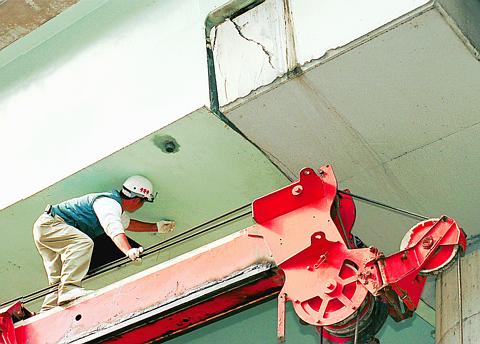In the latest debacle to hit the city's troubled rapid transit system in the past month, a crack was created yesterday in a pillar of the MRT Mucha line while subcontractors carried out maintenance work.
Department of Rapid Transit Systems (DORTS) the government body in charge of construction for the line, blamed the problem on faulty maintenance by subcontractors.
During a routine maintenance check of the lightweight Mucha line early yesterday morning, Chunghua Engineering Company, the subcontractors that built pillars for the elevated line, said they created a crack about one centimeter wide in one pillar between the Chungshan Middle School and Nanking East Road stations.

PHOTO: CHIANG YING-YING
Following the discovery, the Taipei Rapid Transit Corporation (TRTC) stopped trains on the stretch of track north of the intersection of Chunghsiao and Fuhsing Road and ran a free bus service for commuters.
DORTS said they planned to spend 24 hours working on the line and restore operations to normal as quickly as possible.
But DORTS spokesperson Ling Chi-yao (
Consultants yesterday were examining the crack and suggesting longer-term measures for fixing the problem, but DORTS' initial assessment was that a pin between the pillar and the track was put in the wrong position when Chunghua Engineering was trying adjust a tilted connection between the pillar and the track.
Several years of wear and tear from trains travelling overhead had created the tilt, said Ling.
A spokesperson for Chunghua Engineering was at first reluctant to acknowledge that incorrect placement of the pin during construction was the cause of the crack, saying that this was definitely an "accident." But when pressed said, "Yes, the pin was in the wrong place."
Chunghua had placed temporary metal "H-pins" as support around the crack, and DORTS consultants would recommend longer-term measures, he said.
The appearance of the crack yesterday is just the latest in a long series of mishaps for the MRT.
Cracks first appeared in pillars themselves after test runs on the Mucha line began in the early 1990s -- just several years after construction by the line's many subcontractors began in 1988.
During the two years of test runs between 1992 and 1994, trains derailed twice and brakes on trains caught fire twice.
Another of the dozens of subcontractors on the Mucha line, the France-based Matra Transport Co., has been locked in years of legal battles with DORTS over cost overruns and delays during construction. Matra built several portions of the Mucha Line, including the trains themselves and large sections of stations.
The majority of recent problems with the MRT system have been on the heavy-traffic network -- the Tamshui, Chungho and Hsintien lines.
In the last month alone, the TRTC's new mainframe signal computer on that system has failed at least three times, causing major delays, near misses between trains in tunnels and inconvenience for commuters.
The TRTC is now under intense pressure less than a month before its goal of opening a section of the new Panchiao-Nankang line before the end of this year.
TRTC spokesperson Henry Chen (

DAREDEVIL: Honnold said it had always been a dream of his to climb Taipei 101, while a Netflix producer said the skyscraper was ‘a real icon of this country’ US climber Alex Honnold yesterday took on Taiwan’s tallest building, becoming the first person to scale Taipei 101 without a rope, harness or safety net. Hundreds of spectators gathered at the base of the 101-story skyscraper to watch Honnold, 40, embark on his daredevil feat, which was also broadcast live on Netflix. Dressed in a red T-shirt and yellow custom-made climbing shoes, Honnold swiftly moved up the southeast face of the glass and steel building. At one point, he stepped onto a platform midway up to wave down at fans and onlookers who were taking photos. People watching from inside

A Vietnamese migrant worker yesterday won NT$12 million (US$379,627) on a Lunar New Year scratch card in Kaohsiung as part of Taiwan Lottery Co’s (台灣彩券) “NT$12 Million Grand Fortune” (1200萬大吉利) game. The man was the first top-prize winner of the new game launched on Jan. 6 to mark the Lunar New Year. Three Vietnamese migrant workers visited a Taiwan Lottery shop on Xinyue Street in Kaohsiung’s Gangshan District (崗山), a store representative said. The player bought multiple tickets and, after winning nothing, held the final lottery ticket in one hand and rubbed the store’s statue of the Maitreya Buddha’s belly with the other,

‘NATO-PLUS’: ‘Our strategic partners in the Indo-Pacific are facing increasing aggression by the Chinese Communist Party,’ US Representative Rob Wittman said The US House of Representatives on Monday released its version of the Consolidated Appropriations Act, which includes US$1.15 billion to support security cooperation with Taiwan. The omnibus act, covering US$1.2 trillion of spending, allocates US$1 billion for the Taiwan Security Cooperation Initiative, as well as US$150 million for the replacement of defense articles and reimbursement of defense services provided to Taiwan. The fund allocations were based on the US National Defense Authorization Act for fiscal 2026 that was passed by the US Congress last month and authorized up to US$1 billion to the US Defense Security Cooperation Agency in support of the

‘COMMITTED TO DETERRENCE’: Washington would stand by its allies, but it can only help as much as countries help themselves, Raymond Greene said The US is committed to deterrence in the first island chain, but it should not bear the burden alone, as “freedom is not free,” American Institute in Taiwan Director Raymond Greene said in a speech at the Institute for National Defense and Security Research’s “Strengthening Resilience: Defense as the Engine of Development” seminar in Taipei yesterday. In the speech, titled “Investing Together and a Secure and Prosperous Future,” Greene highlighted the contributions of US President Donald Trump’s administration to Taiwan’s defense efforts, including the establishment of supply chains for drones and autonomous systems, offers of security assistance and the expansion of